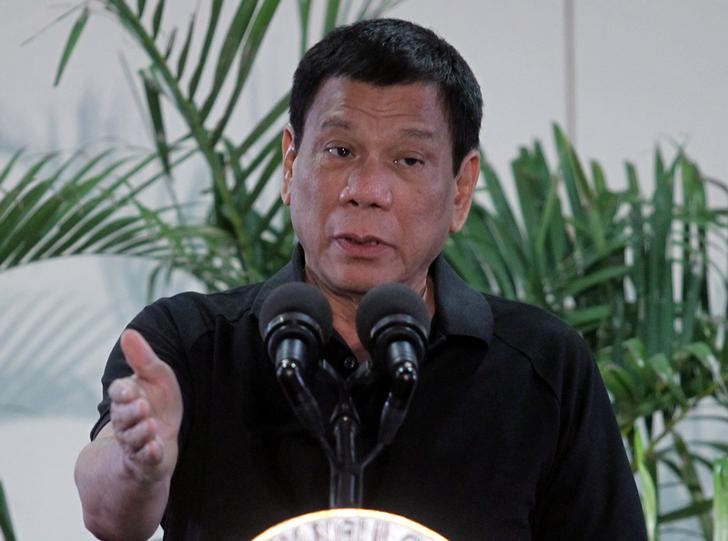
By Karen Lema and Manuel Mogato
MANILA (Reuters) – Philippines President Rodrigo Duterte appeared to liken himself to Nazi leader Adolf Hitler on Friday and said he would “be happy” to exterminate 3 million drug users and peddlers in the country.
Although the administration of U.S. President Barack Obama played down the remark, Duterte’s comments triggered shock and anger among Jewish groups in the United States, which could create pressure on the U.S. government to take a tougher line with the Philippines leader.
U.S. State Department spokesman Mark Toner on Friday said Duterte’s comments, in a rambling speech on his arrival in Davao City after a visit to Vietnam, were “a significant departure” from America’s partnership with the Philippines “and we find them troubling.”
Duterte told reporters that he had been “portrayed to be a cousin of Hitler” by critics.
Noting that Hitler had murdered millions of Jews, Duterte said, “There are 3 million drug addicts (in the Philippines). I’d be happy to slaughter them.
“If Germany had Hitler, the Philippines would have …,” he said, pausing and pointing to himself.
“You know my victims. I would like (them) to be all criminals to finish the problem of my country and save the next generation from perdition.”
U.N. special adviser on the prevention of genocide, Adama Dieng, expressed alarm at Duterte’s comments and urged the Philippines leader to exercise restraint in his use of language, a U.N. statement said.
Dieng also called on Duterte to support an investigation into the reported rise in killings resulting from his anti-drug campaign, the statement said.
In August, Duterte threatened to withdraw the Philippines from the United Nations after it called for an end to the killings.
In Washington, a State Department spokeswoman, Anna Richey-Allen, had repeated concerns about reports of extrajudicial killings in the southeast Asian country but offered no response to Duterte’s comment referring to Hitler.
A White House official on Friday stuck to a strategy of stressing Washington’s long-standing ties with Manila, saying, “We continue to focus on our broad relationship with the Philippines and will work together in the many areas of mutual interest.”
How relations between the U.S. and the Philippines evolve will depend more on what Duterte does than on what he says, administration officials have said.
In Hawaii on Friday, U.S. Defense Secretary Ash Carter met with the defence chiefs of southeast Asian nations, including the Philippines, and U.S. officials said they would use the forum to clarify comments by Duterte that throw into doubt his commitment to military ties with the United States, including joint exercises and patrols.
Carter, speaking before Duterte’s remarks in Davao, said Washington had an “ironclad” alliance with Manila.
‘TONE-DEAFNESS’
Since Duterte took office on June 30, more than 3,100 people have been killed since then, mostly alleged drug users and dealers, in police operations and vigilante killings.
Duterte, who was elected in May on the back of a vow to end drugs and corruption in the country of 100 million people, has insulted Obama and in a number of remarks he has undermined the relationship between Manila and Washington.
On Friday, reacting to critical comments on his war on drugs by U.S. Senators Patrick Leahy and Benjamin Cardin, Duterte said: “Do not pretend to be the moral conscience of the world. Do not be the policeman because you do not have the eligibility to do that in my country.”
Jewish groups quickly condemned Duterte’s Hitler comments.
Rabbi Abraham Cooper, head of the Simon Wiesenthal Center’s Digital Terrorism and Hate project, called them “outrageous”.
“Duterte owes the victims (of the Holocaust) an apology for his disgusting rhetoric,” Cooper said.
The Anti-Defamation League, an international Jewish group based in the United States, said Duterte’s comments were “shocking for their tone-deafness”.
“The comparison of drug users and dealers to Holocaust victims is inappropriate and deeply offensive,” said Todd Gutnick, the group’s director of communications. “It is baffling why any leader would want to model himself after such a monster.”
Duterte has said there will be no annual war games between the Philippines and the United States until the end of his six-year term, and his hostility may make Washington’s strategy of rebalancing its military focus towards Asia in the face of an increasingly assertive China more difficult to achieve.
Murray Hiebert, a Southeast Asia expert at the Center for Strategic and International Studies think tank in Washington, said Obama was “taking the long view” in dealing with Duterte. Obama leaves office in January.
Malcolm Cook, a senior fellow at Singapore’s ISEAS Yusof Ishak Institute, said the U.S-Philippines alliance was not necessarily at risk, but Washington could seek to focus on ties elsewhere in the region.
“We are all in some sense becoming, by necessity, desensitised to Duterte’s language,” he said.
“Diplomatically, the U.S. would say they’ll continue to work with him and the alliance is strong. But it’s whether they’ll continue to strengthen that alliance or not.”
(Additional reporting by Brendan O’Brien in Milwaukee, Yeganeh Torbati in Honolulu, Marius Zaharia in Singapore, Michelle Nichols at the United Nations, Jeff Mason in Jerusalem, and David Brunnstrom and Matt Spetalnick in Washington; Editing by Raju Gopalakrishnan, Toni Reinhold, Grant McCool and Lisa Shumaker)
Copyright 2016 Thomson Reuters. Click for Restrictions.


